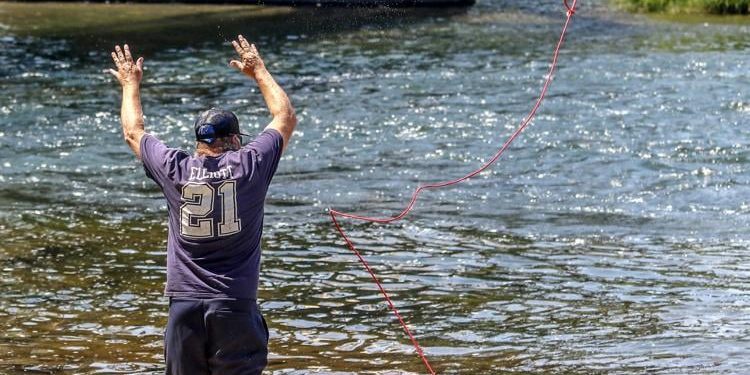Michigan, the “Great Lakes State,” boasts a vast network of rivers, lakes, and canals, making it a prime spot for outdoor enthusiasts. In recent years, a unique hobby has gained traction – magnet fishing. But before you grab your rope and magnet and head to the nearest waterway, you might be wondering: is magnet fishing legal in Michigan?
The answer, like many legal issues, isn’t entirely straightforward. Here’s a deep dive into the regulations surrounding magnet fishing in Michigan, exploring what’s allowed, what’s restricted, and some safety considerations.
What is Magnet Fishing?
Magnet fishing involves using a strong neodymium magnet attached to a rope to retrieve ferrous objects from bodies of water. It’s an activity that combines the thrill of the unknown with the satisfaction of cleaning up waterways. From bikes and shopping carts to lost treasures and even potential dangers, magnet fishing offers a surprising window into what lies beneath the surface.
Is Magnet Fishing Legal in Michigan?
The good news for magnet fishing enthusiasts is that magnet fishing is generally legal in Michigan. There are no state-wide laws specifically prohibiting the activity. However, it’s important to remember that a lack of explicit prohibition doesn’t equate to complete freedom. Here are some key considerations:
- Landowner Permission: Magnet fishing on private property requires permission from the landowner. This applies to any waterfront property, including docks, beaches, and riverbanks. Respecting private property rights is essential to avoid trespassing charges.
- Protected Areas: Certain areas may have restrictions on magnet fishing. State parks, wildlife refuges, designated historical sites, and areas with posted regulations prohibiting magnet fishing are off-limits. Always check with the managing authority before venturing into a specific area.
- Discovery of Historical Artifacts: Michigan protects historical and archaeological artifacts over 100 years old. If you unearth something that appears to be an artifact, it’s crucial to report it to the authorities. Disregarding these regulations could lead to fines or even prosecution.
Michigan Magnet Fishing Spots
Lake Michigan
Imagine casting your line into Lake Michigan’s depths, where historical relics lie beneath the waves. This makes it a perfect spot for those looking to unearth lost treasures while enjoying the scenic beauty of one of the Great Lakes.
Huron River
The Huron River, including areas like Belleville Dam and spots near Ann Arbor, offers a captivating magnet fishing experience. These locations provide ample opportunities to discover intriguing items hidden below the water’s surface.
Lake Cadillac
Lake Cadillac, known for its crystal-clear waters, is another gem for magnet fishing. Picture standing at the edge of this serene lake, feeling the thrill of pulling out buried artifacts with your trusty magnet. It’s a blend of adventure and history waiting to be unraveled.
Grand Traverse Bay
Grand Traverse Bay, with areas like Boardman River, Suttons Bay shipwreck, and the Betsie Rivers, offers unique magnet fishing prospects. Whether exploring a shipwreck or scouring riverbeds for forgotten relics, this bay promises a rewarding magnet fishing expedition.
Saginaw Bay
Saginaw Bay, with its vast area, provides exciting opportunities for magnet fishing. The thrill of discovery awaits among picturesque surroundings, making it a must-visit for any avid magnet fisher in Michigan.
Manistee Lake
Located in Coldsprings Township, next to the city of Manistee, Manistee Lake offers plenty of magnet fishing spots. Its inlet river, River Manistee, is a prime location for magnet fishing treasures, complete with docks, picnic areas, and parking.
Au Sable River
The Au Sable River, located in the lower peninsula of the Mitten State, is another great spot. It forms the boundary of Clinton and Essex counties, offering pristine waters and a scenic environment for magnet fishing.
Houghton Lake
Houghton Lake, in Roscommon County, features many magnet fishing locations. The Reedsburg Dam, which forms the lake, is a popular spot for finding hidden treasures.
Little Bay de Noc
Little Bay de Noc, a bay in northern Michigan, has an extensive network of creeks and streams ideal for magnet fishing. Explore this area to uncover hidden gems.
Read More:
- Is Magnet Fishing illegal in South Carolina? Everything You Need to Know
- Is Magnet Fishing illegal in Texas? Our Legal Do’s and Don’ts to Avoid Trouble!
Michigan Magnet Fishing Laws & Regulations
Michigan’s diverse and scenic waterways make it a magnet fishing haven for those eager to uncover hidden treasures. Generally, magnet fishing is allowed in public waterways, offering the chance to find everything from antique tools to modern-day trinkets.
However, it’s crucial to respect Michigan’s historical heritage. The state has laws to preserve historical artifacts, ensuring these remnants of the past are protected for future generations. Magnet fishers must be aware of these regulations when exploring.
To avoid disturbing protected artifacts, magnet fishers should familiarize themselves with specific regulations in their chosen areas. Some regions may have unique rules to protect historically significant sites, requiring careful adherence.
For example, Michigan law protects artifacts over 100 years old, preserving the state’s rich history. Magnet fishers need to exercise caution to prevent disrupting these historical treasures.
Given the varied regulations, obtaining permission from landowners can enhance the magnet fishing experience and ensure compliance with local laws. Always seek approval before fishing on private property, showing respect for landowners’ rights and fostering positive community relationships.
Respecting private property rights ensures legal compliance and helps maintain good relations with landowners and residents. Securing permission promotes mutual understanding, allowing responsible magnet fishing without encroaching on others’ property or rights.
Additionally, seeking landowner consent can provide valuable insights into the historical significance of the area. Landowners may have knowledge about local history and magnet fishing hotspots, enriching the experience and building valuable community connections.










